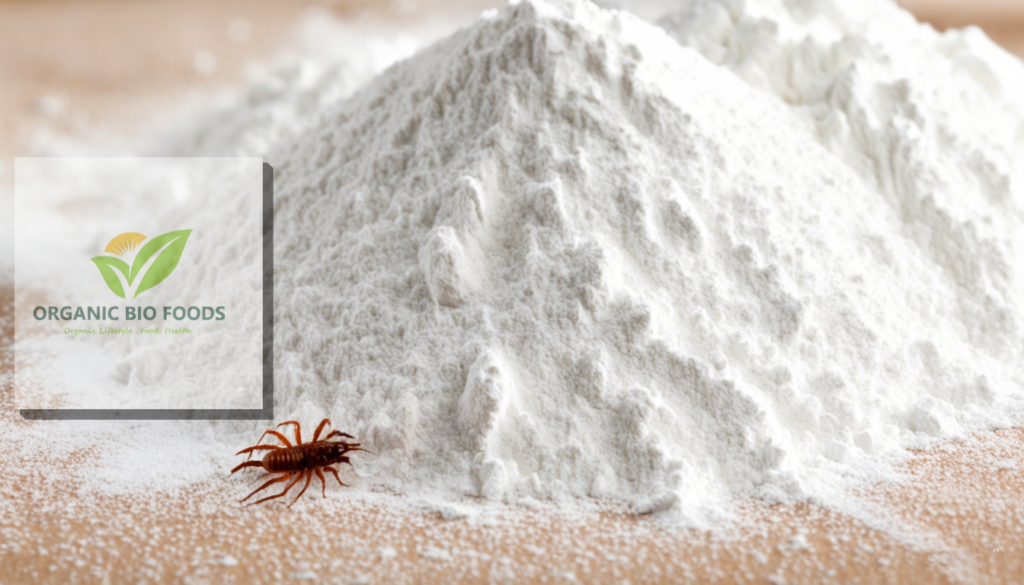If you’ve been exploring organic gardening, you may have come across something called diatomaceous earth. It sounds a bit like a scientific term you’d hear in a chemistry lab, but it’s actually a natural, eco-friendly substance that can work wonders in your garden. In this post, we’ll dive into what diatomaceous earth is and how you can use it to enhance your organic gardening efforts.
What is Diatomaceous Earth?
Diatomaceous earth (often abbreviated as DE) is a naturally occurring, soft, sedimentary rock that crumbles into a fine white or off-white powder. It is made from the fossilized remains of tiny aquatic organisms called diatoms. These organisms have been around for millions of years and, over time, their silica-based skeletons have accumulated in large deposits on the seafloor. When these deposits are mined and processed, we get diatomaceous earth, which is rich in silica, a key component for both plant and human health.
The Types of Diatomaceous Earth
There are two main types of diatomaceous earth: food-grade and industrial-grade.
- Food-grade DE is safe for human and animal consumption and is the type you’ll want to use in your organic garden. It has numerous applications in both agriculture and food storage.
- Industrial-grade DE is used in filtration systems for pools and other large-scale industrial purposes, but it’s not safe to use in gardens or around food.
Now that we understand what diatomaceous earth is, let’s explore how it can benefit your organic garden.
5 Uses of Diatomaceous Earth in Organic Gardening
1. Natural Pest Control
One of the most popular uses of diatomaceous earth in organic gardening is as a natural pesticide. Unlike chemical pesticides, DE is non-toxic to humans and animals, making it a safer option for your garden.
How Diatomaceous Earth Works as a Pest Control in Organic Gardening : DE is made up of tiny, sharp particles that are harmless to us but deadly to insects. When insects like ants, aphids, or beetles come into contact with the powder, it clings to their exoskeletons and dehydrates them, causing them to die. According to research published in the Journal of Pest Science, DE can effectively control pests without the need for chemical treatments.
How to Use It: Simply dust a light layer of food-grade diatomaceous earth around the base of plants or directly onto the leaves. Be sure to reapply after rain or watering, as moisture can reduce its effectiveness.
2. Improving Soil Health
Diatomaceous earth isn’t just a pest controller; it can also improve your soil’s overall health. DE contains silica, which is a beneficial mineral for plants. Silica helps plants absorb nutrients more efficiently, strengthens cell walls, and can even improve drought tolerance.
How Diatomaceous Earth Works to Improve Soil Health: Silica in diatomaceous earth helps improve the structure of plant cell walls, making plants more resilient to environmental stresses. A study by the Journal of Plant Nutrition found that silica-enriched soil can promote stronger and healthier plants, making them more resistant to disease and drought.
How to Use Diatomaceous Earth to Improve Soil Health: To use diatomaceous earth for soil health, mix it into your garden soil before planting. You can also sprinkle it around established plants to give them a silica boost.
3. Natural Slug and Snail Deterrent
Slugs and snails are notorious for munching on garden plants, especially leafy greens. While there are many chemical solutions to get rid of these slimy invaders, diatomaceous earth offers a safer, organic option.
How Diatomaceous Earth Works as a Slug and Snail Deterrent : Like with other insects, the sharp, microscopic particles of diatomaceous earth create an inhospitable environment for slugs and snails. The powder scratches their soft bodies, causing them to dehydrate and die.
How to Use It: Spread a thin layer of diatomaceous earth around the perimeter of your garden beds or individual plants that are prone to slug or snail damage. Reapply as needed, especially after rain or heavy watering.
4. Compost Improvement
Composting is a great way to recycle organic matter and enrich your soil with nutrients. Adding diatomaceous earth to your compost pile can enhance the composting process by helping to manage pests and improve the overall quality of your compost.
How It Works: The addition of diatomaceous earth can deter pests like flies and maggots that are attracted to the organic matter in your compost pile. DE also helps aerate the compost, which promotes faster decomposition.
How to Use Diatomaceous Earth to Improve Compost: Sprinkle a small amount of diatomaceous earth over each new layer of your compost pile. This will help keep pests at bay and improve the compost’s overall quality.
5. Organic Seed Storage
Storing seeds properly is essential for maintaining their viability for future planting. Diatomaceous earth can play a role in protecting your seeds from moisture and pests during storage.
How It Works: DE acts as a natural desiccant, meaning it absorbs moisture and keeps your seeds dry. It also protects against seed-eating insects and rodents, ensuring that your seeds remain safe for the next growing season.
How to Use It: To store seeds using diatomaceous earth, place your seeds in a container and add a small amount of DE. Seal the container tightly and store it in a cool, dry place. The DE will absorb excess moisture and prevent pests from damaging the seeds.
Benefits of Using Diatomaceous Earth in Organic Gardening
Diatomaceous earth offers several benefits for organic gardeners:
- Non-Toxic and Safe: DE is safe for humans, pets, and the environment. Unlike chemical pesticides, it won’t contaminate your soil, water, or crops.
- Cost-Effective: A little goes a long way. You don’t need to use large amounts of DE to see results, making it a budget-friendly option for gardeners.
- Dual Purpose: DE can be used for both pest control and soil improvement, making it a versatile tool in organic gardening.
Things to Keep in Mind When Using Diatomaceous Earth
While diatomaceous earth is a fantastic tool for organic gardeners, there are a few things to keep in mind:
- Avoid Breathing It In: Although food-grade DE is safe for use around your garden, the fine powder can irritate your lungs if inhaled. Always wear a mask when applying it.
- Reapply After Rain: Diatomaceous earth loses its effectiveness when it gets wet, so you’ll need to reapply it after watering your garden or following a rainstorm.
- Use Food-Grade Only: Make sure you are using food-grade diatomaceous earth in your garden, as industrial-grade DE is not safe for humans or animals.
Conclusion
Diatomaceous earth is a fantastic, eco-friendly solution for organic gardeners looking to improve their plant health and control pests without resorting to chemicals. By incorporating diatomaceous earth into your gardening routine, you’ll be able to maintain a healthier, more resilient garden while keeping it organic and sustainable. Happy gardening!








